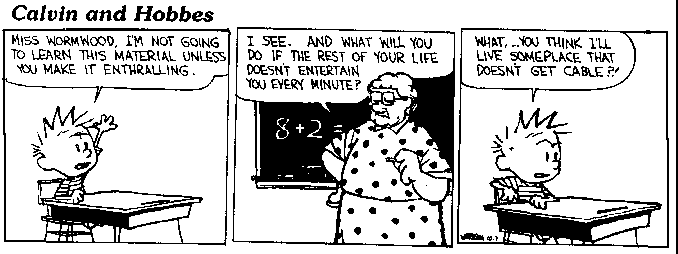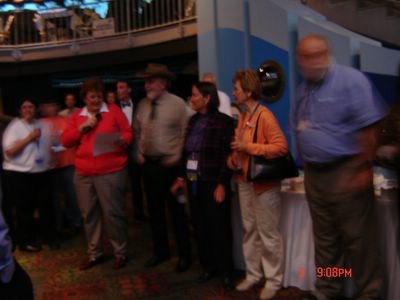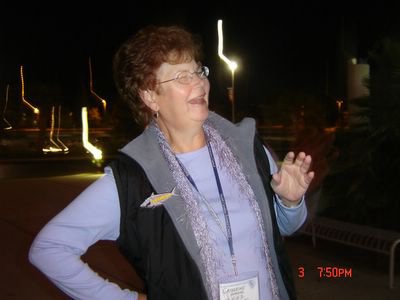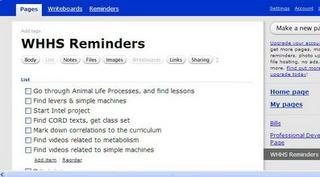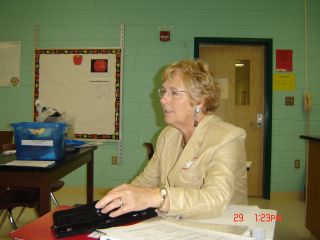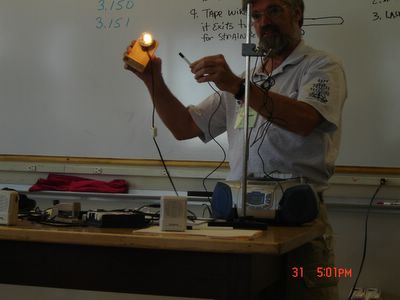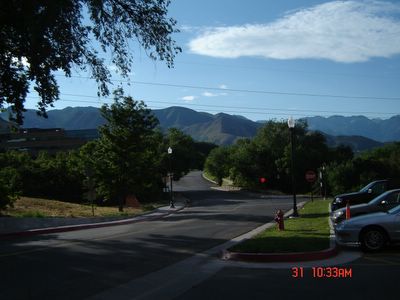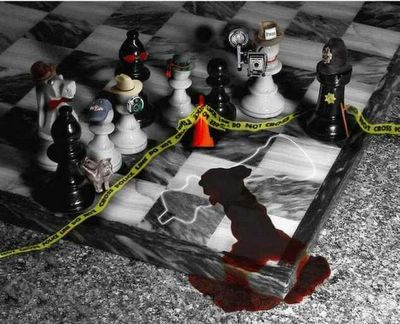I've posted about Alliteracy (not INability to read, just a disinclination) before. A potentially bigger problem is INNUMERACY - inability to understand math.
Unlike alliterates, innumerates don't understand the basics; they can add, subtract, multiply, and divide (at least with a calculator), but they often have absolutely no clue when to perform which operation in real life. Hence, you have the problem of cashiers who cannot give proper change without prompting (and will unhesitatingly accept whatever the display tells them, no matter whether it makes sense or not), restaurant customers who cannot calculate the 15% tip (hint: try figuring out what 10% is, then adding half again as much), and even the large numbers of taxpayers who enrich the commercial preparers by paying for the 1040EZ to be filled out.
Many students confuse the process for entering division problems into a calculator with the procedure for hand-calculating them. In fairness, it's anti- the standard American practice of reading left to right.
Even more students (and their parents) have difficulty with understanding or using fractions and decimals. Too many elementary teachers are not totally comfortable with those functions - they can do it, but they can't coherently explain the process, and the mathematical reasoning for it.
One suggestion I've heard over and over again is - no calculators until at least middle school - some would raise that to high school. It's not that use of calculators mysteriously inhibits learning math, but that students' facility with the tool keeps teachers from learning who still doesn't understand the process.
Where, in this scenario, can technology fit?
Possibly, some of the better programs may be able to help students. I've heard good things about CAI programs such as Successmaker. At least in improving basic skills, they have been known to be of assistance.
However, too often, computer use in elementary and middle schools is a huge waste of time.
- When researching, many students are uncritical consumers, blindly accepting the first few sites to pop up in a web search.
- Often, teachers spend an inordinate amount of time monitoring students' activities, & keeping them from playing games, aimless browsing, and reading about sports, music, and tv/movies.
- Most webquests are a joke, replete with factoids, trivia, and role-playing. They seldom are worth the time they take.
- One exception to the general rule - The Jason Project is excellent. It is well designed, packed with activities that are aligned to standards (Science, Math, English, and Geography), and easy to use. It also has Student Journal, book reading and discussion forum, and teacher interactions. That last is important, as it gives inexperienced or isolated teachers the benefit of collegial feedback.
One advantage to Jason is the training program - teachers are taken through the curriculm, and try out selected activities. Each year, teachers can return to learn about the new mission (it changes yearly).
What can be done if a student is behind 2 or more levels in math?
- Thorough evaluation, followed by individualized program of remediation.
- Use of a Mastery approach. Math is cumulative - failure to understand a basic concept leads to later failure, particularly when the math is taught via an integrated curriculum.
- Grades should be Pass/Fail. "Effort" Ds are all too common. A "D" indicates that the student does NOT understand the concept.
- Proficiency tests are a floor. If a student can't pass them, that indicates a serious problem. I've heard students say they "only missed passing" by 1 or 2 questions. EVERY students should pass these tests with room to spare.
Graduation should mean more than just barely managing to fulfill requirements.
Tracking has a bad reputation. Sorting students by presumed ability level is said to discriminate against miniorities.
I have an alternative suggestion: tracking by desire to learn.
All students who want to be in the highest-level, can.
There's just one catch - they can be dropped if they can't keep up. Any student in the lowest section of the class (1/4 to 1/3), must work extra (tutoring, before/after school assistance, CAI, online help, etc.).
What about the student who is chronically absent? What about them - if they work to keep up, they can stay. But if they can't cut it, good-bye.
This may sound harsh. But it's realistic. In high school, I had struggled with geometry, due to many absences (I had chronic brochitis, & was later diagnosed with asthma). Some things in life go to those that work harder. would American Idol contestants win if their performance was lacking, but they hadn't been well or had family problems or had a cold & couldn't hit the high notes? I think that's a major reason the "reality" shows are so popular - they don't take excuses for failure. They do't allow "do-overs".
In professional sports, it's similarly a game of survival of the fittest. Lebron doesn't get spotted a few extra points because he's jsut a kid.
If you play in the big boy's game, you play by the big boy's rules.
No exceptions.
